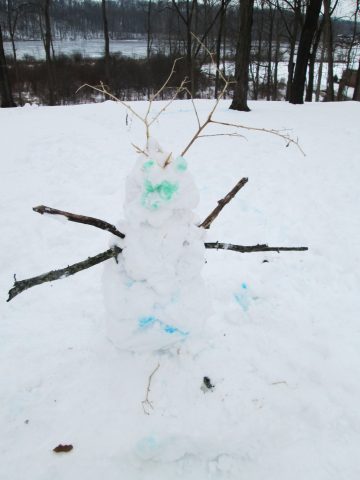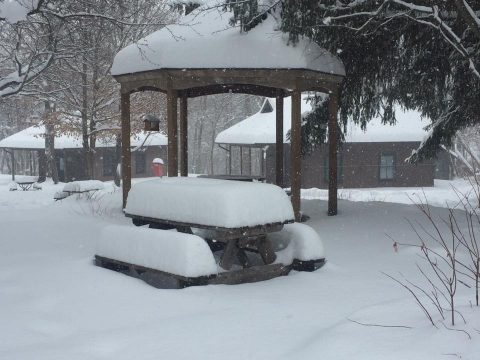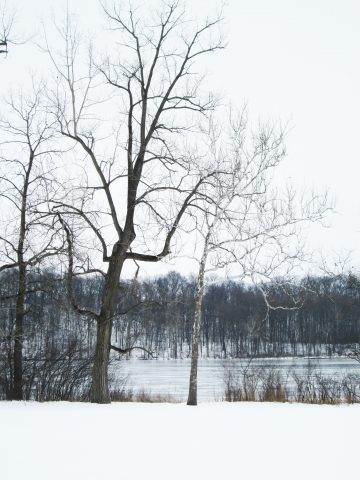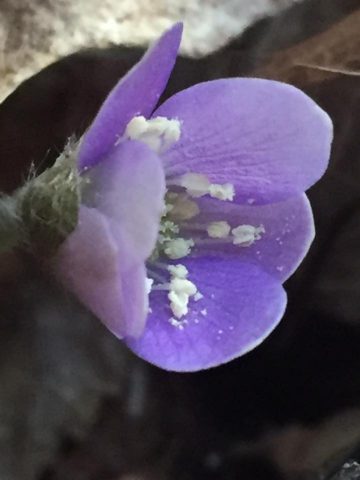
It seems like just a few weeks ago that Camp was blanketed with more than a foot of snow. We were all thrilled to see the winter playground stick around for Family Camp — a wonderful weekend of tubing, crafting, snow sculpting, and even curling (on the lake ice, though curling up by the fire took place, too). Not long after the snow we were inundated with rain, and the combination of melting snow, little absorbing vegetation, and precipitation resulted in destructive flooding throughout the region.
What a ride! Surely the pendulum will swing back and forth a few more times before warm weather is here to stay, but birds and squirrels have been downright rowdy, communicating that spring is on its way. While most of us appreciate the respite of a warm day here and there in February/March, it’s hard not to read a solemn reminder in this winter’s weather and in the increasingly common extreme weather events: Our climate is changing.
How do we respond when faced with change that feels unstoppable or bigger than us, or with information that for some is uncertain, or controversial? At Camp, as we witness sometimes alarming changes in the world around us, we are reminded that the course of action most in line with Camp values is to treat the Earth with respect, regardless of whether our actions ultimately change the climate’s trajectory. We embrace our responsibility as stewards and strive to tread lightly in this space shared with so many other creatures not out of political leanings, but out of respect for the creation.

Our Resilience and Sustainability Plan [RSP] is one way we’re committing to stewardship – both of the Earth and of Camp Friedenswald. We’ve shared about the plan here before, and you’ll soon receive an update in the Friedensword. Here we wanted to provide access to some of the resources we’ve been using so that you can take steps to assess how you live in community with the Earth, too. Commitment to such a plan helps us frame decisions so that we’re always working toward a greater good, and also provides opportunity for daily implementation of Camp’s core values.
The RSP will make Camp Friedenswald a more resilient and sustainable organization, ensuring that Camp is around for future generations and contributing to the good in the world. The plan addresses goals from a fundamental triad of social, environmental, and financial components, such as strengthening education for sustainability and creation care, increasing financial growth and accessibility, reducing waste and fossil fuel based energy, and protecting biodiversity.
With the guidance of Sustainability and Outdoor Education Director Amy Huser, Camp has committed to prioritizing about 20 goals for 2018. Here are the top ten from that list:
- Connect people to nature through land use
- Implement fair wages
- Compost/decrease food waste
- Collaborate among staff
- Educate staff
- Achieve 5-10% financial surplus
- Improve energy efficiency / investigate use of renewables
- Continue mindful land management practices
- Reduce waste
- Increase intercultural competence of staff
- Add environmental sustainability components in programming
- Increase use of organic/local food

We’re also excited to report that we’ve already made considerable progress! Some of the major accomplishments include adding the Resilience and Sustainability page to Camp’s website, meeting our financial goal of a 5-10% surplus for 2017, moving forward with land management work, and implementing sustainability education for staff and board.
One area of progress that is sure to be exceptionally rewarding is the implementation of energy efficiency plans and improvements, along with the establishment of baselines necessary to assess changes. To give you just one example: In 2018 Camp will switch to 100% LED bulbs, providing a savings to Camp of approximately $70,000 over 20 years. This transition will also reduce our kwh used for lighting alone by about 22,000 kwh per year, which is equal to the electricity used by 2.4 homes for an entire year, or to 16.2 metric tons of CO2.
As we try to make sense of weird or alarming weather, as we witness signs of change in seasonal patterns, and as we constantly think about future generations, what course of action is there but to move forward with commitment to respectful and intentional living? If you’re interested in what you can do, check out any of the links below, and join Camp staff and board members as we work toward greater awareness of how to live not as a burden on the world around us, but in cooperative and sustainable coexistence. And of course, come see us at Camp where we can all celebrate this beautiful and amazing Earth together.

CAMP FRIEDENSWALD 2018 READING LIST
Compiled by Sustainability and Outdoor Education Director Amy Huser
ESSENTIALS
If you want to learn about …
Your impact:
Global Footprint Network’s Ecological Footprint Calculator: This highly respected calculator takes you through a simple quiz to estimate how many earths it would take to support your lifestyle. It also offers insight into what makes up your ecological footprint, and how to work on lowering the number of earths needed.
Global Weirding with Katherine Heyhoe: “I’m just one person, what can I do?”: Hosted by climate scientist, Texas Tech professor, and evangelical Christian, Katherine Heyhoe, this seven minute Global Weirding episode explains what one person can do to help stop climate change. The entire video series is excellent.
Ecosystems at Camp:
Exploring the Prairie Fen Wetlands of Michigan. Online PDF of a book by Michael A. Kost and Daria A. Hyde (2009) (a few copies also available in Camp Store). This is an excellent book to familiarize yourself with Camp’s special Prairie Fen.
Benefits of Nature on Human Well-being:
“This Is Your Brain on Nature.” Article in National Geographic by Florence Williams
OR Florence Williams TEDx talk (under 12 minutes)
OR super short version: The Nature Fix promo video (just under 2 minutes)
Global Sustainability:
UN Sustainable Development Goals (look over)
The Pope’s 2015 Encyclical (Look over introductory comments and chapter 1)
R&S at Camp Friedenswald:
Resilience and Sustainability Webpage for Camp Friedenswald
Camp’s Resilience and Sustainability Plan Overview
Triple Bottom Line (framework used for R&S Plan)
“The breakthrough thinking of the triple bottom line.” This article in Sunpower gives the business case for using the triple bottom line.
Mennos and Creation Care:
Baseline Survey Results Highlight Divergence, Convergence in Mennonites’ Beliefs on Sustainability & Climate. Survey results from the Center for Sustainable Climate Solutions (a collaborative initiative between EMU, Goshen College, and MCC) on Mennonite attitudes to sustainability and climate.
RECOMMENDED
If you want to learn more about …
Ecosystems at Camp:
Oak Savannas: A description of the type of ecosystem Camp is restoring on Allen Hill.
Ecoregions 56h and 56b p.19 and p. 23-24. These are brief descriptions of the land, soil, water, vegetation, etc. of the Camp’s land and the surrounding area.
Map of ecoregions in Michigan and surrounding states
R&S at Camp Friedenswald:
Camp Friedenswald Stewardship Projects blog posts by Susie Huser
Benefits of Nature on Human Well-being:
Book: The Nature Fix by Florence Williams (2017)
Book: Last Child in the Woods by Richard Louv (2008)
Book: Vitamin N: The Essential Guide to a Nature-Rich Life: 500 Ways to Enrich Your Family’s Health & Happiness by Richard Louv (2016) – Louv’s latest work.
Global Sustainability:
“Paris Agreement: 10 things you should know about the Paris Agreement, and what they mean for you.” Brief Nature Conservancy Article describing Paris Agreement.
Climate Change:
Global Weirding, hosted by Katherine Heyhoe: Short videos help explain the questions people have about climate change. Produced by PBS Digital Studios.
“Winning Slowly is the Same as Losing.” Article by Bill McKibben in Rolling Stone on the urgency of action for climate by a leading writer, speaker, and activist for climate action.
Climate Change is Complex: We’ve got answers to your questions. Nice summary of climate FAQs in the New York Times.
The Big Five: What are the five biggest global challenges we face right now–and what can we do about them? TED Radio Hour podcast episode – climate change is first 12 minutes, but the entire show is excellent.
Project Drawdown: Website, movement, and book discussing “the most comprehensive plan ever proposed to reverse global warming.” Book edited by Pau Hawken.
Biodiversity Loss:
“U.N. Expert: Biodiversity Is Essential To Human Rights.” Article in Huffington Post.
“Sixth Mass Extinction? Two-thirds of Wildlife May Be Gone by 2020: WWF.” Article from CNN.com.
“By 2050 the ocean could have more plastic than fish.” Article in Business Insider.
Triple Bottom Line:
“The Triple-Bottom-Line: What is it and how does it work?” Article in Indiana Business Review describing Triple-Bottom-Line and giving indicators for each area.
Circular Economy:
“7 Pillars of the Circular Economy.” This article from greenbiz.com gives a great description of the ultimate goal of the circular economy.
Book: The Upcycle: Beyond Sustainability – Designing for Abundance by William McDonough and Michael Braingart (2013)
Mennos and Creation Care:
MCCN (Mennonite Creation Care Network) website
Book: Rewilding the Way by Mennonite writer and pastor Todd Wynward
About the book: “When did we become so tame? How has “the good life” come to mean addiction to screens and status, fossil fuels and financial fitness? Can we break free to become the joyful and prophetic people God calls us to be? Packed with inspiring stories of how contemporary people and groups are caring for the land and each other, Rewilding the Way issues a call to action.”
Miscellaneous:
Poems by Wendell Berry: “The Peace of Wild Things” and “A Poem on Hope”
Bill Moyers interview with Wendell Berry (40 minutes)
Living on Earth podcast: Public Radio International’s environmental news magazine and podcast — an excellent podcast to keep up to date on all things in environmental news.
Book: Active Hope: How to Face the Mess We’re in without Going Crazy by Joanna Macy and Chris Johnstone (2012).
About the book: “The book guides the reader through a transformational process informed by mythic journeys, modern psychology, spirituality and holistic science. This process equips us with tools to face the mess we’re in and play our role in the collective transition, or Great Turning, towards a life-sustaining society.”